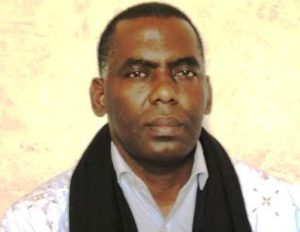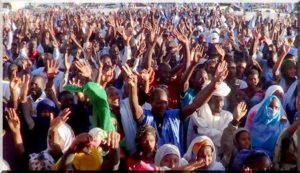Minds of the Movement
An ICNC blog on the people and power of civil resistance
by Biram Dah AbeidSeptember 14, 2017
Editor's note: The Initiative for the Resurgence of the Abolitionist Movement (IRA) is on the frontlines of the nonviolent struggle against slavery and discrimination of oppressed groups in Mauritania — a country where an estimated 43,000 to 140,000 people or more remain enslaved despite an anti-slavery law passed in 1981. For nearly a decade, IRA has helped free thousands from slavery, despite significant violent repression to its members and their families.
In this interview translated from the original French, IRA President Biram Dah Abeid, who has been a political prisoner for his activism, explains why the movement chose nonviolent action for advancing its human rights struggle: equal parts ideology and strategy, but also commonsense. Starting with his personal journey from awakening to becoming involved in nonviolent struggle, Biram shares why and how support for IRA continues to grow, mainly that they are — as we all know — “on the right side of history.”
Cliquez ici pour lire l'entretien avec Biram Dah Abeid en français (version originale)
Translation by Amber French.

Biram Dah Abeid. Source: biramdahabeid.org
Can you describe your journey of becoming involved in civil resistance? Was there a key moment that compelled you to action?
Biram: My nonviolent resistance against the social and political oppression I’ve known since birth first began when I started questioning my family environment and teachers. The latter took this as a sign of early rebellion and thought I was questioning social and religious assertions. Subsequently, I became active in student protest movements and helped lead village-based organizing against the arbitrary decisions of religious leaders and the system of land feudalism. I then went on to help found movements to defend the most vulnerable and demand that existing anti-slavery and anti-racist laws be implemented.
Today, I am the leader of IRA [the Initiative for the Resurgence of Abolitionism in Mauritania] which, through nonviolent acts of religious and social dissidence, has brought tremendous hope among the oppressed, caused a great deal of trouble for the rulers, and gained increasing sympathy from foreign observers and partners to the cause.
The key moment that compelled me to action happened when I was 10 years old. I witnessed a rare scene during which a master used violence against a slave who clearly had superior physical strength. People were saying the slave was shackled, but I couldn’t see any chains. It truly struck me to later learn that they were referring to psychological, not physical “shackles.”
How can a movement facing severe repression like IRA manage to rally active supporters, despite the risks involved for themselves and their families?

IRA in Zouerate, Mauritania. Source: biramdahabeid.org
Biram: Our steady and growing support comes from people who have already measured the necessity and sacredness of their high-risk involvement in this movement. These people assimilate their engagement with their own survival and that of their descendants. From there stem not only enthusiasm and a spirit of sacrifice, but also an overall assurance that the movement will stick to principles of legality, equity, morality, and humanism. Those who are involved are certain that they are on the right side of history. Proof of this is that all the heroes of our movement, despite the violence and torture they have endured, have always been celebrated and welcomed as great men and women by many of our people.
How important do you think it is that IRA leads a nonviolent struggle, even against such a violent system? Why is nonviolent struggle effective?
Biram: For religious, moral and other reasons, the founding members of IRA do not believe that violence carries any benefit or utility. Violence is counterproductive to humanitarian actions. It can spiral out of control. It espouses evil, oppression and injustice, which only draw us back into violent terrains, which give the advantage to such forces. Responding to violent actors with violence only justifies the atrocities, destruction, and misery they cause.
Our nonviolent, pacific ideology and action are part of what will continue to allow humanity to survive and prosper in peace. Nonviolent action certainly resonates with the aspirations of oppressed people, but perhaps equally as important, with the buried and dormant aspirations of violent people who belong to oppressive groups.
What types of civil resistance related activities does IRA engage in?
Biram: We organize protests in front of symbolic places of injustice, such as courthouses, police stations and ministries. IRA also engages in nonviolent occupation of such places, and engages in hunger strikes and nonviolent direct action in prisons and courts to deconstruct the strength, omnipotence and coercion on which the oppressors proudly lean.
What would you say is the movement’s greatest achievement so far?
Biram: One of the greatest victories of the movement to date is demystifying people’s fear of state-sponsored violence and of being imprisoned. We know this because our popular support continues to grow despite the powerholders’ repeated forceful attempts to deter people from engagement. The other victory, no less important, is the fact that there is a great deal of buy-in from Mauritanian youth for nonviolent action, both in ideology and in practice.
This interview was a collaboration between Minds of the Movement and the Unrepresented Nations and Peoples Organization (UNPO), with thanks to Julie Duval and Marvin Kumetat. UNPO is an international, nonviolent and democratic membership organization whose members are indigenous peoples, minorities, unrecognized states and occupied territories that have joined together to defend their political, social and cultural rights, to preserve their environments and to promote their right to self-determination.
SaveSave

Biram Dah Abeid
Biram Dah Abeid is an anti-slavery activist and politician from Mauritania. He founded the Initiative for the Resurgence of the Abolitionist Movement (IRA-Mauritania). IRA was a recipient of the 2016 James Lawson Award for Outstanding Achievement in Nonviolent Conflict.
Read More